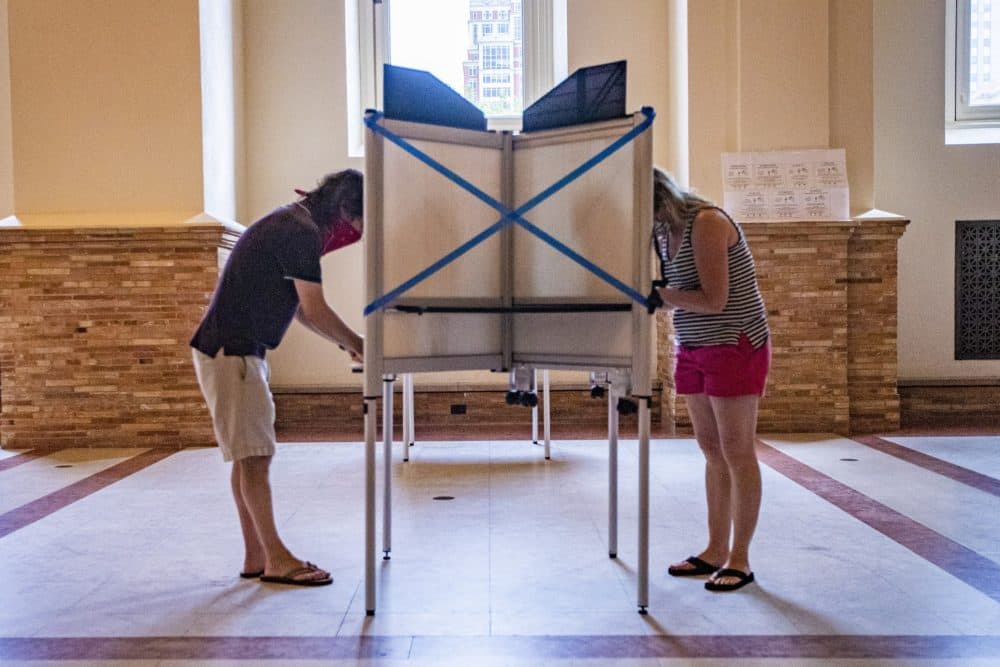Advertisement
Commentary
Ranked Choice Voting Failed. ‘Jungle Primaries’ Might Be Our Best Hope For Fair Elections

Just because Question 2 lost doesn’t mean there isn’t a problem with the way we run our elections.
The ballot initiative, you may recall (and if you don’t, all is forgiven — it does seem so long ago) proposed something called “ranked choice voting.” It was urged as a solution to the concern of politicians winning elections even while getting less than a majority of the vote. The initiative was backed by tons of money — much from outside the state — and had the support of seemingly every Bay State politician of note, with the exception of Governor Charlie Baker. Meanwhile, the opposition was almost non-existent and had little funding.
The result seemed forgone — we’d follow the path of the great state of Maine, which had adopted just this sort of thing four years ago.
Except the voters rebelled. Question 2 lost by a convincing 55% to 45%.
I voted with the majority. Ranked choice voting seemed far too convoluted to me, requiring voters to come to the polls not only knowing who they wanted to win but also knowing who would be their choices for second, third, fourth and so on. And it held out the real possibility — which actually did occur in Maine two years ago -- that the pol who got the most “first-choice” votes could nevertheless lose.
In the case of the Fourth Congressional, there’s good reason to believe a face-off between Auchincloss and Mermell would have resulted in a Mermell victory ...
Still, consider the case of the Fourth Congressional District. With Joe Kennedy III making his ill-fated run for U.S. senator, the seat opened up in 2020. Nine Democrats were on the September ballot. Jake Auchincloss eked out a razor-thin 2,033 vote victory over Jesse Mermell. But what’s most striking is that Auchincloss received only 22.4% of the vote. Mermell got 21.1% and the other candidates divided up the rest. And because the Fourth Congressional District is true-blue Democrat, the general election in November was a non-event — Auchincloss’s win was a sure-fire thing. Auchincloss in effect was elected with less than a quarter of the vote — and in a Democratic primary as well, where Republicans and independents (unless they same-day enroll as Democrats) don’t even vote.
This was the situation that ranked choice voting was supposed to fix. But there are other possible solutions.
One is used in Georgia, and we’re about to see it in action this January with both of that state's U.S. senatorial positions. Georgia holds runoffs if no one gets a majority of the vote. The problem with special elections such as this, however, is that turnout tends to be low. General elections attract lots of voters, drawn by the many positions on the ballot. Special elections tend to bring out only the most committed, leaving behind the rest of us who perhaps aren’t so fiercely partisan.
Advertisement
The best solution, I think, is called "jungle primaries." Also called "preliminary elections," "nonpartisan blanket primaries" or "qualifying primaries," these elections are used in a handful of jurisdictions around the country. California recently adopted jungle primaries, but the closest to home is in Boston. The mayor and city councilors have been elected in jungle primaries with great success for decades. In 2013, a dozen people ran for mayor. All of them (notwithstanding party affiliation) vied for voters’ favor in the September preliminary. The top two vote-getters (Marty Walsh and John Connolly) then faced off against each other in the November final. Walsh won.
Preliminary and final elections force candidates to build coalitions. They need to reach out to their defeated opponents ...
Would any of this make a difference? In the case of the Fourth Congressional, there’s good reason to believe a face-off between Auchincloss and Mermell would have resulted in a Mermell victory — much of the fragmented field seemed more inclined toward her brand of politics.
But it isn’t only the result that might change. Preliminary and final elections force candidates to build coalitions. They need to reach out to their defeated opponents, seeking support. They are forced to appeal to a majority of voters, making the case for why they would be the best choice.
All of this may seem a little arcane, but there are good reasons to care about a majority of voters actually electing a representative. As we’ve seen in the case of the Electoral College, a candidate who wins the presidency without also winning a majority (or even plurality) of the vote lacks some level of legitimacy. Democracy depends upon the consent of the governed. Jungle primaries help us get there.
